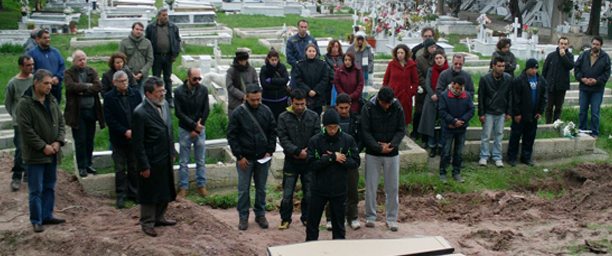“Grief itself is not enough”
On Sunday January 13, 2013 three corpses have been found on the seashore of south Chios Island. They belonged to refugees trying to cross the European borders. On December 15 a refugee boat heading from Turkey to Greece capsized near Lesvos Island, twenty eight people - including women and children- tragically drowned. Earlier, on September 6, sixty three people lost their lives in a tragic shipwreck near the coast of Izmir, more than half of whom were children.
These refugees were seeking protection in Europe with the hope to find a life in dignity and safety. Ironically, just a few weeks earlier Europe had been rewarded the Nobel Prize for Peace. However, the European Union keeps its eyes shut when it comes to the daily shipwrecks at Europe’s marine borders. Moreover, the EU actively focuses on the enforcement of policies that increase the risk of migrants’ death at sea by sealing the borders and harshening deterrence measures, thus playing a key role in this “game” of life and death.
While Greece is currently struck by a deep financial crisis paralleled by a shockingly broad dispersion of the neo-fascist thought and discourse in mainstream society and an increase in brutal racist attacks, the government implements one of the toughest migration policies of the last years. The dominant doctrine is deterrence: mass arrests and detention of migrants in huge concentration camps under inhuman conditions with up to 18 months of detention for asylum seekers and undocumented migrants, an increase in deportations, readmissions and “voluntary returns”, lack of access to asylum procedures or other services of protection and social welfare for vulnerable groups such as unaccompanied minors, are among the most alarming policy implications. In the meantime, the authorities are involved in “informal” returns at the sea border, whereby overcrowded inflatable boats with migrants are being pushed back into the Turkish sea. The authorities simply refer in public to this as an act of “deterrence”. These operations are conducted in collaboration with the army, the coast guard and Frontex. They knowingly increase the risk of naval accidents for the small migrants’ boats that move in the dark of the night filled with children, pregnant woman and people often desperate enough to flee war on this risky road.
On the other side of the Aegean, in turkey, with the increased number of refugees arriving there both from Syria and other countries, the deficiencies of the Turkish asylum system become even more evident. These include: the policy of maintaining a geographical limitation” to the 1951 Geneva Refugee Convention, which excludes non-European refugees finding a durable solution in Turkey; the difficulties in getting access from detention; the preferred official practice that lets to-be-refugees leave rather than give them access to asylum procedure; “voluntary returns” and deportations; the longer and longer waiting periods without any meaningful support to those in asylum procedure; up to 3 years waiting period to register at the UNHCR; the lack of standard practices all contribute to the vulnerability of refugees and force them to continue their journey into Greece and further risking their lives in the high waves of the Aegean Sea or in the strong currents of the Evros.
These tragedies are first of all the immediate result of the militarization of the borders and the idea to "protect fortress Europe from an invasion of migrants".
We as Greek and Turkish activists, members of "KAYIKI" - a collective of information exchange on migration issues and refugees and migrants support - are devastated by the death of so many people in the Aegean Sea during the tragic shipwrecks.
We call upon the EU, the European and Turkish governments, the public and civil society to end the fight against migration and build a rights-based and safe environment for people seeking refuge. Grief itself is not enough, we need to continue to act and fight. The rights of the weakest exist not only in legal texts and theory but also in their daily struggle for a better world and we will continue to fight for these rights and we ask everyone to participate.
Info about KAYIKI
In August 2008, academics, human rights activists and artists from Turkey, Greece, Austria and Germany held a series of meetings in the Greek island of Chios and Dikili. The group later named itself "Kayiki".
The main theme of these meetings were to seek for ways to enhance the living conditions of the refugees who are trying to reach Greece via the Aegean Sea almost every day and to raise the voice against the deaths occurring during their “journey for hope”.
As a result of these meetings, The Kayiki Group took some concrete decisions such as to increase the interaction of both countries’ NGOs, to better keep track of the refugees and violations against these in order to take necessary precautions and to raise a campaign to increase awareness. The movies, postcards and the radio spots are available in Turkey and Greece primarily, as well as the whole Mediterranean countries and other countries.






